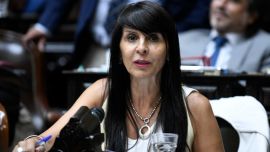Every week, day and hour that passes, Argentina’s financial situation worsens, to such an extent that it is now difficult to see the bottom of this crisis. The economy is crumbling, politicos are losing their nerves, and every misstep they make damages the present and immediate future of Argentines. Extreme situations, however, require out of the box solutions.
The outcome of the August 11 primary was primarily the consequence of the original decision taken in May by Cristina Fernández de Kirchner. Contrary to most expectations, the former president announced she would not run for president, and that she would endorse Alberto Fernández instead. For now, her former Cabinet chief is the anecdote of this story, though. The substantive part of Fernández de Kirchner’s move is that it cleared the way for a Peronist reunion, an event which proved efficient enough to settle the presidential race earlier than expected.
President Macri made a lukewarm effort to imitate her, appointing Miguel Ángel Pichetto – for two decades the symbol of all things Peronist in the Senate and a politician on the verge of retirement – as his running-mate.
The decision sought to soothe the markets in the short term, deploying the argument that Macri would open up his coalition in an eventual second term and carry out the reforms he could not achieve during his failed first term. Pichetto’s handiness, however, will likely never be tested. This is because the electoral problem was actually Macri all along. Unlike Fernández de Kirchner, whose decision indirectly acknowledged that she was the problem, Macri did not see it with clarity.
The final vote count of the primary, released this week, which excludes blank and spoiled ballots from the percentage count, has Fernández with 49.5 percent versus Macri’s 32.9 percent. But Macri has a second chance – and how he uses it will define his future chances. He now has to understand that he is the problem for Argentina’s struggling economy, due to his dual role as head of state and underdog candidate.
It might even bring relief for the president, who is not enjoying his job these days. Only this past week he went from euphoria last Saturday, when his supporters gathered in Plaza de Mayo to give him a push toward October, to a gloomy appearance on Thursday morning, the day after his government announced a complex programme to “reprofile” the country’s short and medium-term debt of a total of roughly US$105 billion. In words, his mood shifted from “We’ll win in October” to “No government can do this transition alone.”
There is a way out of the dilemma: Macri has to drop out of the presidential race. He has to tell Argentines that he will not campaign – and he does not have to campaign either. His name and face can remain in the ballots, so that the thousands of Juntos por el Cambio candidates are not left orphaned without a presidential contender. But he has to bunk off the campaign and ignore the outcome of the election, in order to devote every minute of his working day to steering the country. More people might actually vote for him if they see he has made a political sacrifice for the common good.
The format of President Macri’s exit from office will not only define the immediate economic start of the next government, but also the longer-term future of his political group, which he carefully crafted over 12 years before reaching the summit in 2015. Argentina’s political system needs equilibrium and Macri’s party has an important role to play, plus a handful of good, younger leaders who can pick up his legacy and hope for a comeback. Most importantly though there has to be a legacy in the first place, and that is currently in Macri’s hands.
At the speed the crisis is gaining, the general election – still almost two months away – seems almost trivial. The opposition should refrain from making the government pay too high a cost for creating an unruly final sprint. On Monday, Alberto Fernández’s team issued an incendiary statement after meeting with the International Monetary Fund’s delegation. Tensions are mounting. At this stage in the country’s history, Argentines might not care to tell the difference between outgoings and incomings, when it comes to how they funnel their anger.



















Comments